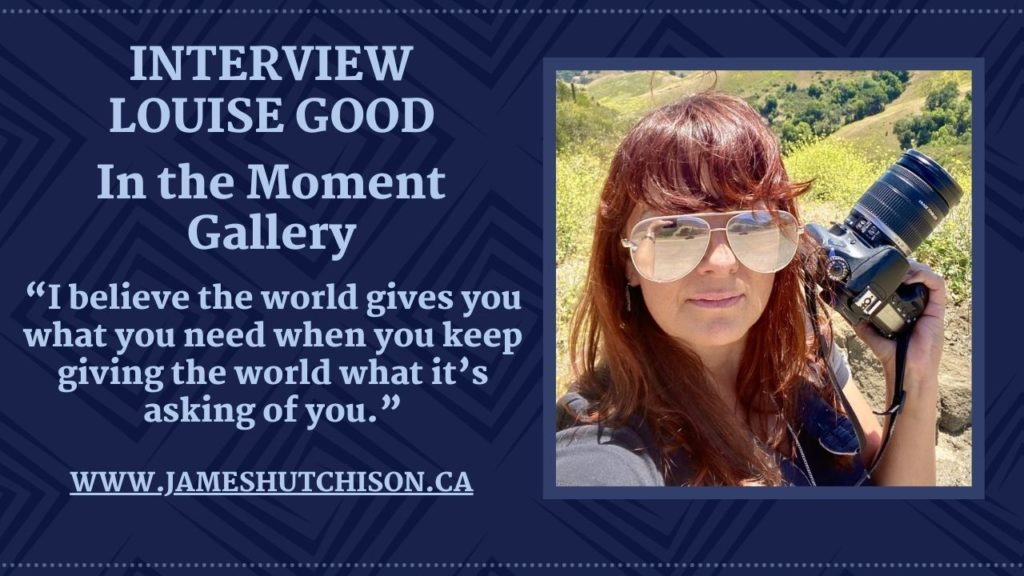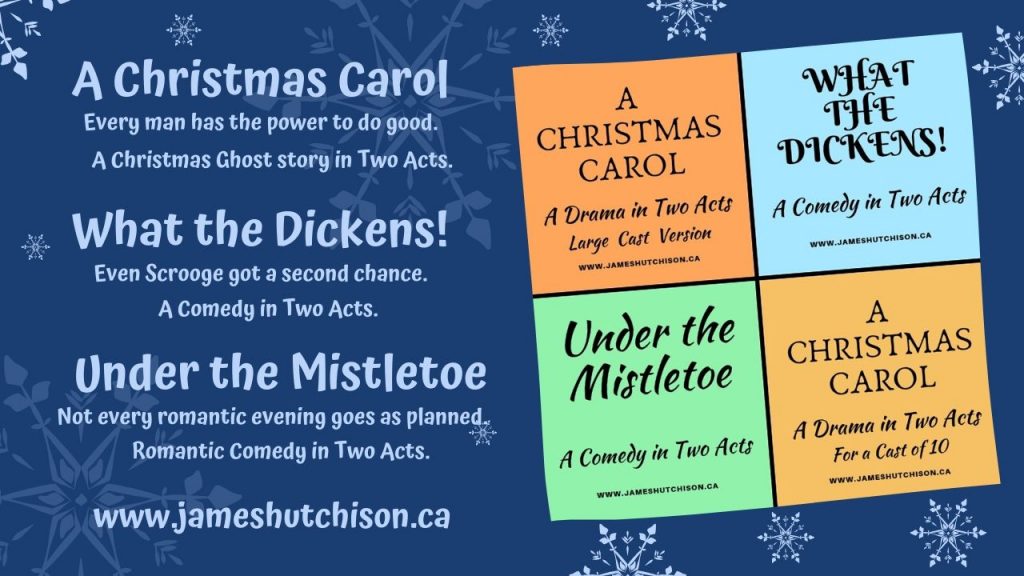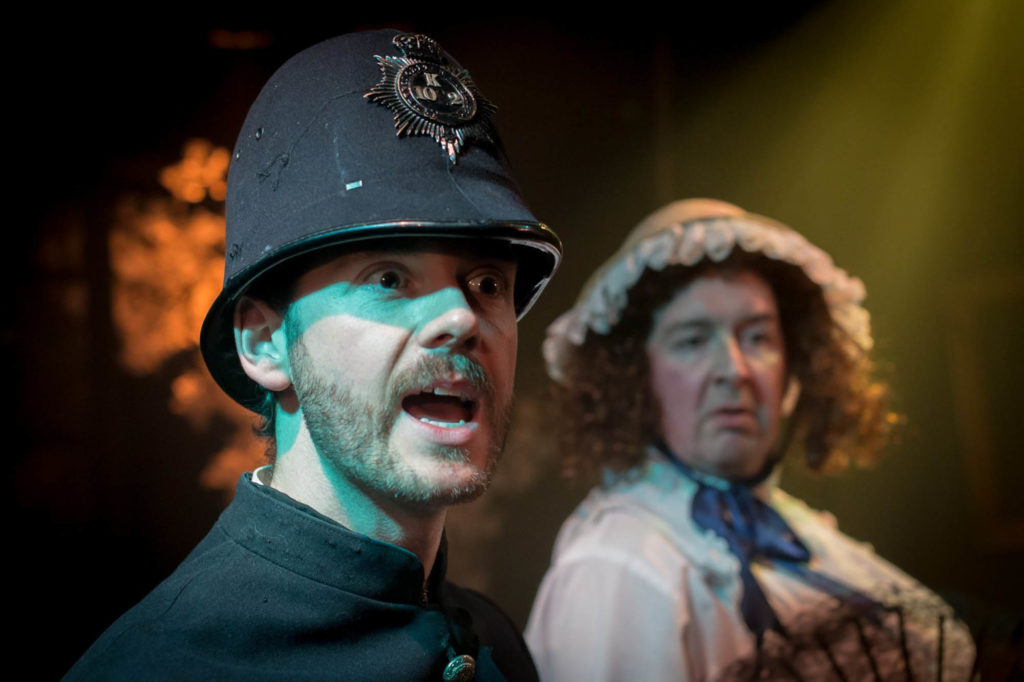
“The Invisible Man is a gem… this wonderful story is chock-full of fifteen characters – excluding the titular Invisible Man – all brilliantly realized by a super-creative and multi-talented company of three actors undoubtedly putting the force into tour de force! This is a master class in extended acting and characterization… a smart, tirelessly inventive telling of this enduring tale.” ★★★★★ The Review Chap
That’s just one of several four and five-star reviews for playwright Derek Webb’s adaptation of The Invisible Man by H.G. Wells which had a highly successful run in London at the Jack Studio Theatre a few months before COVID shut things down. In addition to being a prolific and successful playwright, Derek is also the founder of the Pint-sized Plays Festival which presents plays in Pubs during the Tenby Arts Festival and culminates in a script slam presentation on stage at Theatr Gwaun in Fishguard, Wales.
Now almost two years after The Invisible Man last appeared – or didn’t appear on stage – theatres are starting to cautiously welcome patrons back to live performances. I contacted Derek at the end of August to chat with him about his writing and this year’s Pint-sized Plays Festival which features favourite plays from previous years including my own ten-minute comedy Never Give Up.
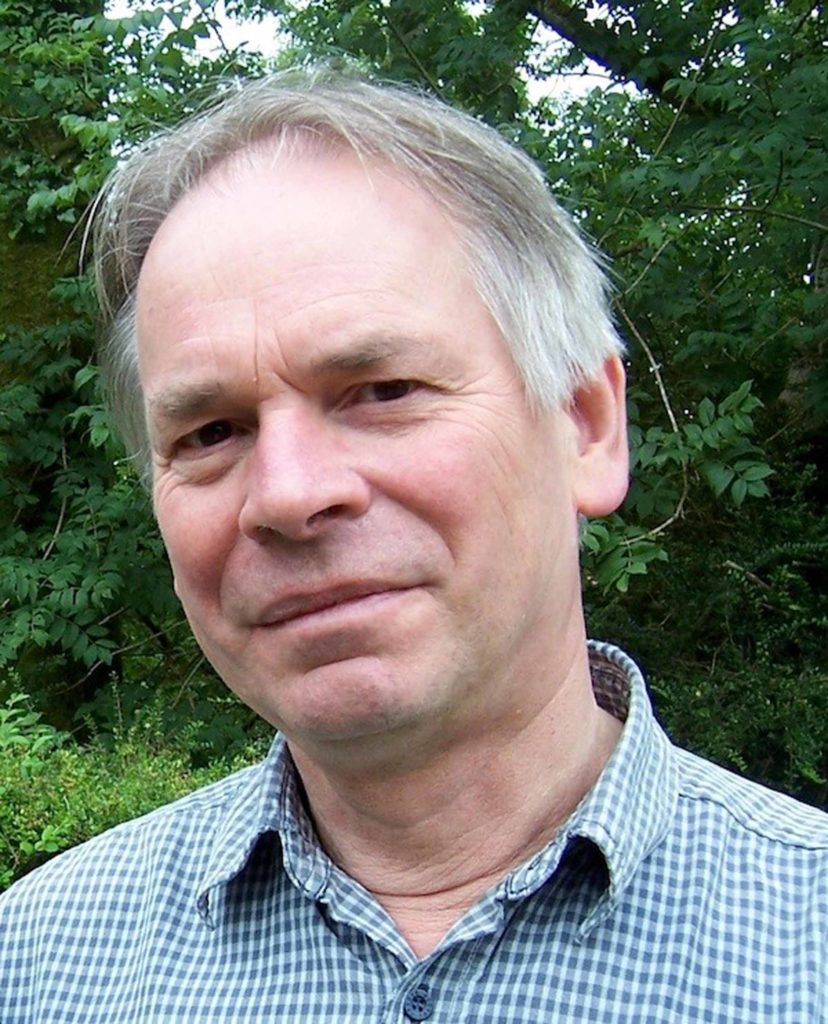
JAMES HUTCHISON
I read that since 2001 you’ve lived in North Pembrokeshire, and I’m wondering what’s the community like – the people – the culture – what is it about the area that made you want to make this home?
DEREK WEBB
Well, we lived in Surrey near London, and we had been down to Pembrokeshire many times on holiday. I was working as a freelance copywriter with some companies down in Swansea and Cardiff, and I used to come down to South Wales quite often, and property prices down here were about a tenth of what they were in London, of course, and we found a house and fell in love with it, and we decided to move down.
We’re in North Pembrokeshire which is predominantly Welsh-speaking. It’s the language of the home. But we found it absolutely charming. And they were just lovely people and very welcoming and not standoffish at all. We just loved the people and love the place.
JAMES
You’re a playwright and author and a poet and so when you go to the theatre what are your hopes when you’re sitting there and the lights are going down and the curtain is about to rise.
DEREK
There are plays which you can watch and it’s like you’re looking through a window at it, and there are other plays where you’re actually there. You’re actually taken away. And those stories are the ones that stick in my memory. And it’s such a wonderful thing because it’s live. Because it changes night by night, and because it can be totally immersive and involving. Unlike cinema or television, there’s no actual barrier at all. It’s live. It’s life.
JAMES
Is there a play or two that you can share with us that sticks in your memory?
DEREK
Tom Stoppard’s Arcadia is just wonderful. I think it’s probably my favourite play actually. There’s layer upon layer upon layer of things happening. It’s in two different time frames, but things coalesce at the end. It’s quite magical.
And another play that sticks in my memory is David Mamet’s Oleanna which is actually running in London at the moment. I remember seeing it a good few years ago now with Lia Williams and David Suchet. And it’s very, very relevant now because of the #MeToo movement. It’s that sort of thing. The university professor and the student, and turning tables and not knowing, as an audience, which one to back. It’s wonderfully involving. Those are the two that sort of strike me immediately.
JAMES
How did the idea for the Pint-sized Plays Festival come to you?
DEREK
Tenby is a small seaside town in Pembrokeshire. And each year they have an arts festival which is fairly low-key. There are two or three proper venues, and they have talks and music and a few other things. It’s not a big festival. It’s just a week.
I’d been involved with theatre companies writing and acting and directing, and I felt that the theatre world still seemed to be very elitist. And the inspiration for the idea was to try and create something that took theatre literally to the people.
I was talking with a committee member of the Tenby Arts Festival, Chris Sierwald, and the idea was about doing plays in actual pubs and not pub theatres. That was the important distinction. Not in a pub theatre. So, not in a dedicated space, but actually doing it in the pub itself – in the bar area. And we thought we’d just try it. So we started a competition and had a hundred and fifty-odd entries or whatever, which was quite good from a standing start, I thought. And we ended up with six winners and four runners up. The idea was that we’d run the six winners in pubs in Tenby over two nights, and then all ten plays would go up to a theatre in North Fishguard where we’d have a script slam, where the audience gets to vote for their favourite play and favourite script.
Chris, my contact at the Tenby Arts Festival, who was well known in the town, stood up and said, “Ladies and gentlemen we’re going to do these plays here in the pub.” And then, with a lot of trepidation, I stood up and said, “And the first play we’re doing is – and announced the play.” And what was amazing was that this pub that was really busy with a lot of people talking went quiet and they listened to the play. I have to admit I was surprised at how well it went down – and relieved! These weren’t theatre audiences, you know. These were pub people. Out for a drink.
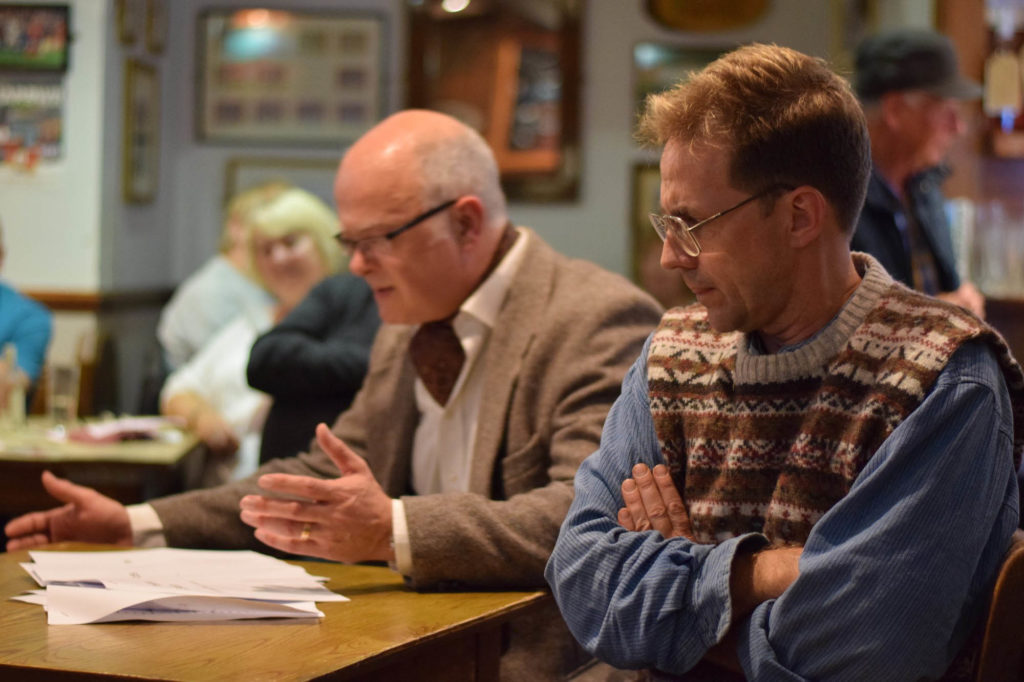
JAMES
So, what type of play works really well in a pub?
DEREK
Mainly comedies but we had a play called, Sorry, which was basically two monologues to the audience really. There’s a woman talking about how this kid had broken into her home and he’d stolen, and then there was a monologue from the kid, and at the end of the play there’s a scene where the two meet for a sort of reconciliation because he’d been arrested, and it turns out that he’s actually her son. It worked really well. I was worried about putting that one up because most of the things have been comedies, but it worked, and subsequently we’ve done a few dramas and, by and large, they have worked as well. The audience has been appreciative. Which is extraordinary because if you asked a lot of these people, “When did you last go to the theatre?” They’d say, “I’ve never been to a theatre.” And yet they were there obviously understanding and enjoying the play.
JAMES
How has COVID impacted things?
DEREK
In 2020 COVID hit here in March by which time the competition was underway. So, the Tenby Arts Festival decided to cancel. They weren’t going to run anything. So, we ended up videoing all the plays and all ten winners went up on YouTube.
This year we didn’t have a competition, and we’re actually in rehearsals at the moment because we’re going to run the Pick of Pint-sized Plays – which isn’t the best of – it just happens to be plays that the actors and directors have done in the past and said they’d like to do again.
Interestingly, one of the plays we’re running is called Pub Play. And it’s written by a guy called Doc Watson. And it was a runner-up in the very first year. It didn’t run in the pubs, but it ran in the script slam, and it won the script slam.
And two or three days ago on a Facebook post Doc was talking about his playwriting, and he mentioned Pint-sized Plays and said that he’d been working in theatre as a stage manager for years and years and years but had never actually written a play other than a few odd sketches. And this play, called Pub Play, which he wrote for Pint-sized Plays was his first play, and subsequently he’s gone on to write other things.
And that’s a great thing about Pint-sized. It has actually introduced a lot of people into writing and writers into writing 10-minute plays, and many have gone on to write other stuff which is really terrific. We’re proud of that.
And then hopefully next year we’ll do another competition and get back to where we were. That’s the basic plan.
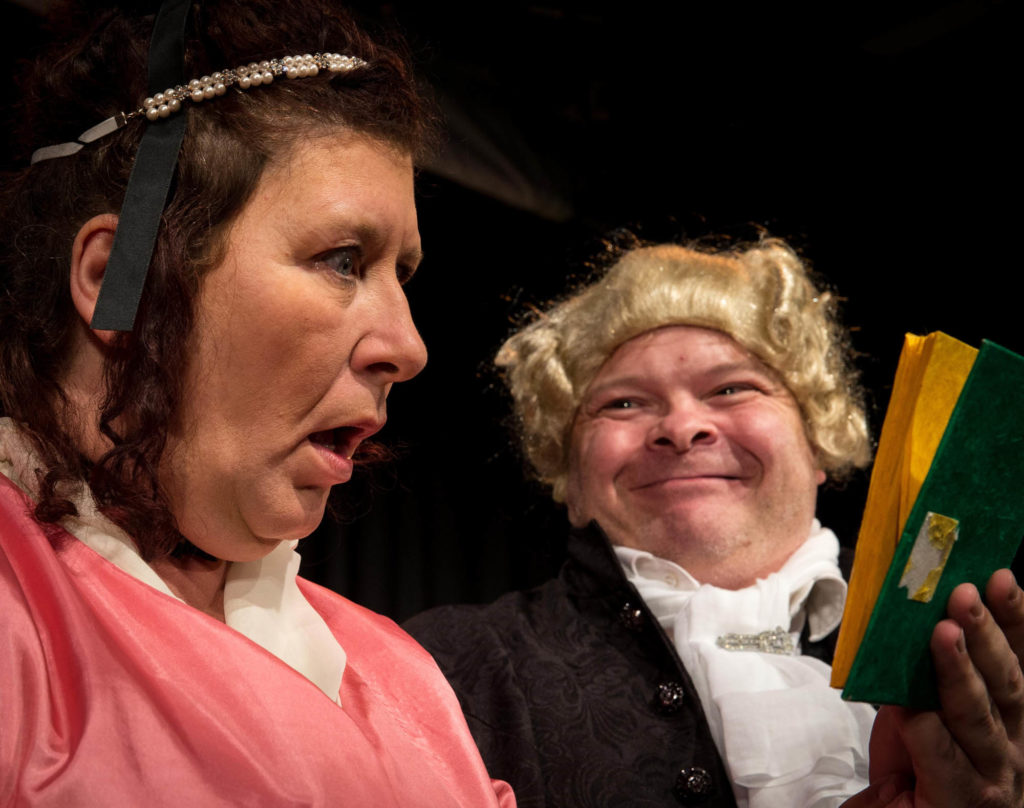
JAMES
You’ve been writing for many years. And you write plays and novels and poetry and screenplays and I’m wondering when you look at your body of work now do you notice in your own writing any reoccurring themes or topics that you like to explore?
DEREK
A lot of my stuff is comedy. I’ve done some biographical plays and that interests me in terms of taking somebody’s life and actually trying to distill it into a ninety-minute piece of theatre.
JAMES
One of your plays is Call Me Dusty which is about Dusty Springfield. Tell me how that play came about and how that project developed.
DEREK
We decided to set up a small theatre company called Ignition in 2012, and it just so happened that 2013 was going to be the 50th anniversary of Dusty Springfield’s first solo single – I Only Want to Be With You. So, I started researching and went through eleven or twelve biographies, and I listened to more and more of her music, and I really got into it.
She was absolutely extraordinary because she was this very self-conscious very young sort of convent schoolgirl who wanted to sing and to be a great star, and she was also a lesbian, and she was trying to balance these two things in the ‘60s and the ‘50s.
Now, what I didn’t want to do was a musical. I wanted to do a drama. So, all the music in the play is Dusty Springfield herself singing. And the actress playing Dusty Springfield doesn’t actually sing. There’s one time where she’s doing her first appearance on Top of the Pops, which was her first solo single. And at the time on the television show they mimed. They didn’t have live acts. So, for us to have her miming I Only Want to Be With You was exactly what happened on Top of the Pops.
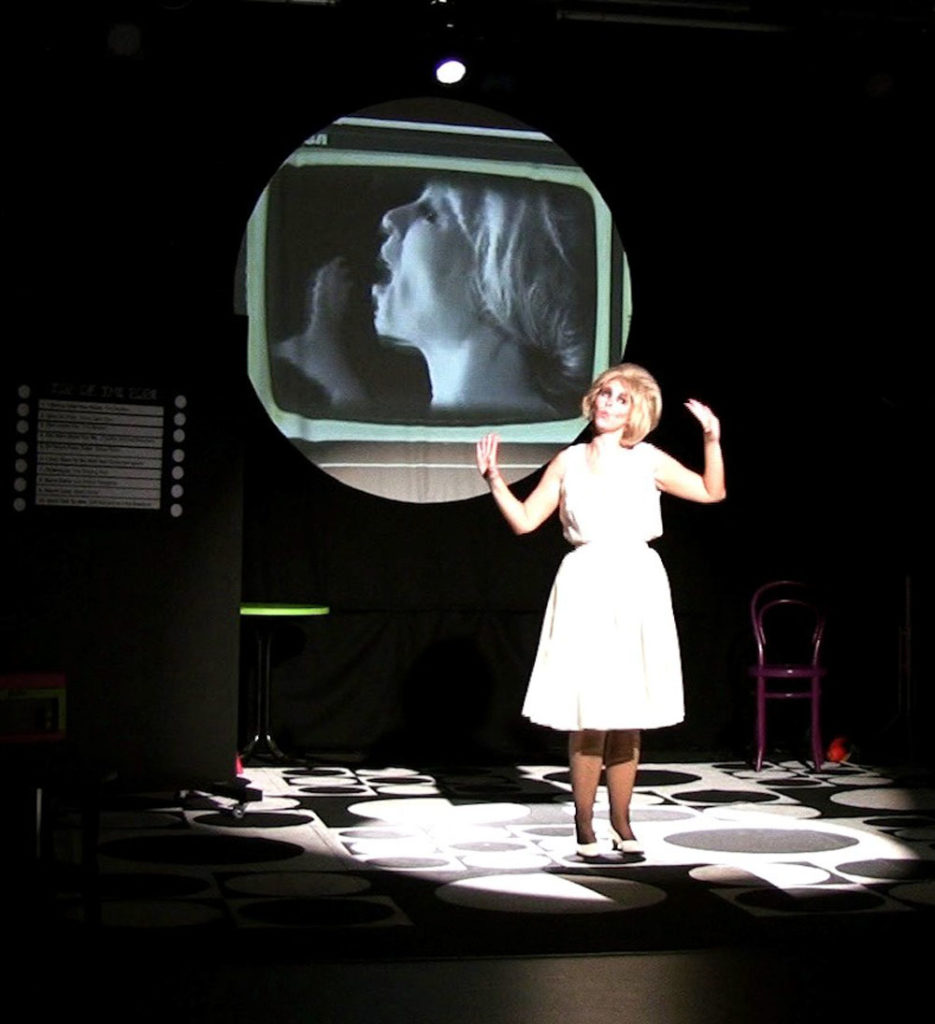
JAMES
Not too long ago you did an adaptation of The Invisible Man by H.G. Wells.
DEREK
With The Invisible Man, I wrote it so that three actors could play all the parts like in The 39 Steps – so each actor plays five characters. And it was terrific fun because the audience can see what’s happening. They’re in on the jokes. There’s a point when the police catch the Invisible Man and they manage to slap these handcuffs on the Invisible Man’s wrist. But, beside the chain holding the handcuffs together, there was a piece of stiff wire, so they stood out from the policemen’s wrist and look like they’re attached to the Invisible Man, and the policeman gets pulled across stage. And that worked really well. The actor playing the policeman was actually a magician. He added lots of little magical things into the script. We toured it around Wales to about ten venues and then Jack Studio, which is a Pub Theatre in London, took it up and ran it for about three weeks just prior to COVID hitting.
I also adapted The Lady Vanishes from the book that the Hitchcock film was based on – which has proved very successful and it’s being produced by Bacchus Theatre of Canada in October as an online production. I’m looking forward to hearing that.
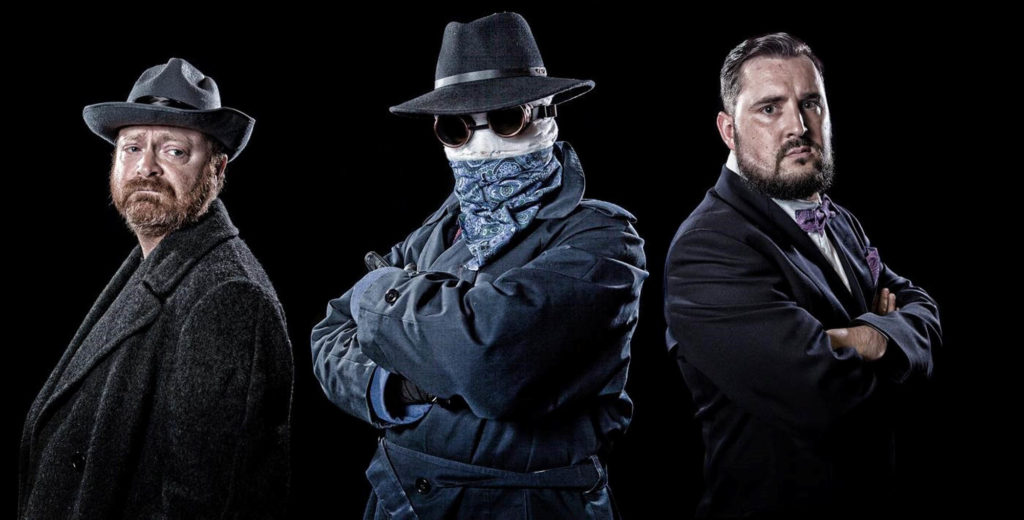
JAMES
I read that the first stage play you did was Dog Eat Dog which is a play about an advertising executive who moves in with a group of homeless people. That was in 1998. How did that play evolve? And what was it like going to opening night and seeing your first production on stage?
DEREK
Scary, because you’re thinking, “Oh my god.” And exhilarating, of course, at the same time.
As a kid I wrote a lot of poetry, and I think I might have written a play, and I started a novel during my first marriage, and then I went into advertising and ended up as a creative director, which was great, but what that did is take all the creative energy away. So, I mean, I was writing all day – and by the time I got home I was absolutely knackered.
When I got to my second marriage is when I started writing plays again. My wife, Briony, said, “You really should try writing again.” And so, I started writing some radio plays. And I wrote Dog Eat Dog for an amateur company in London. South London Theatre. They’re a big company, and they have a lot of directors and very good actors and do a lot of good stuff, and a friend, Marcelle Clow, was directing and – I think she probably said, “Could you write something?” And I wrote Dog Eat Dog and that was the first stage play as such. And it went down well, and that was the start!
JAMES
So, you write both drama and comedy, and I’m wondering if the process differs depending on whether or not you’re in the world of comedy or the world of drama?
DEREK
I structure everything to start with, so I know where I’m going. I know people when writing novels go, “I’ll just go where the novel takes me.” Well yeah, but I actually want to know where I’m going. And that discipline is certainly the same for both drama and comedy.
The Agatha Crusty series, which is probably the most successful series I’ve done, started because a local drama company had done a couple of my one-acts and liked them and the director said, “Could you write a murder mystery for me to direct?”
And I sat down with Briony to try and come up with some ideas, and this goes back to Pint-sized Plays in a funny way as well, because they were an amateur company – and their audience is not a theatre-going audience. What they do is watch television or film. That’s their point of reference. Not the theatre.
So, in trying to write something we went through loads of television-type ideas – reality TV – quiz shows – whatever. And then we got onto detectives and Miss Marple and Hercule Poirot and suddenly the name Agatha Crusty popped into my brain – out of nowhere and – that’s it – Agatha Crusty!
At the time I was working on a committee to save a local theatre here in Pembrokeshire which the council wanted to close. I was on the committee, and we thankfully managed to save the theatre. But being on that committee totally did my head in – and the first – Agatha Crusty is called Agatha Crusty and the Village Hall Murders and what happens is the Village Hall Committee gets murdered one by one by one. Which was my way of exacting vengeance on them you see.
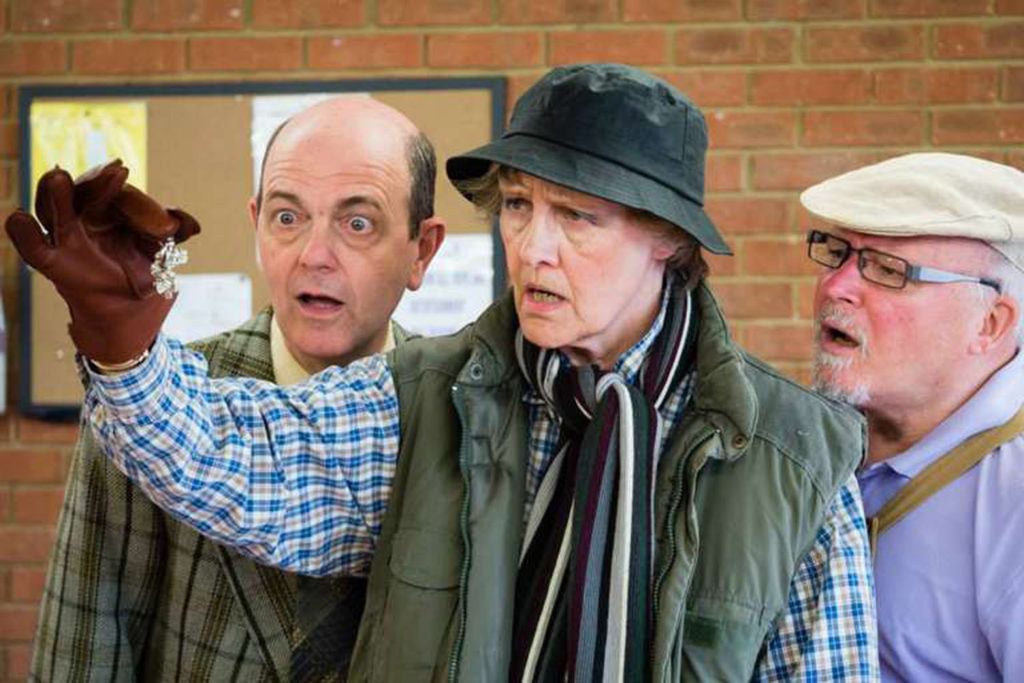
Now writing subsequent Agatha Crustys you have to structure it well because you need to know who did the murder and how they did it and then work backwards. Apparently, sometimes Agatha Christie herself used to write a novel and she’d get to the end of the book and she would change the murderer and then have to go back through the book and put in clues to make that character the murderer. So, whilst Agatha Crusty and The Village Hall Murders might be a comedy and Call Me Dusty might be a drama the process is actually very very similar in both regards.
Sometimes though serendipity takes over halfway through something, and an idea gets introduced, and that coincides with something else, and that links to something else, and the brain suddenly has all these things there and bing! Literally, out of the blue, the thing can go off on a different course. And it can just coalesce in a wonderful way and sometimes when that happens you get to the point where you can’t type fast enough.
There’s a series I do called Roy Brown, and I’ve written about six Roy Brown comedies now, and there’s Roy and his friends and when I’m writing it they really are talking to me. It’s absolutely wonderful. I just write down what they say.
And in the first one I wrote Roy Brown has this idea that the bluestones, which are the small stones in the middle of Stonehenge which are from Wales, should be returned to Wales like the Elgin Marbles should be returned to Greece. I wrote that back around 2000 and to get some publicity I sent some letters into the local papers purportedly coming from Roy Brown saying, “Stonehenge back to Wales.”
Then a friend in Cardiff rang me and said, “Have you seen the Western Mail today?” The Western Mail is sort of the national newspaper of Wales. I said, “No.” And there on the front page, it said “Pembrokeshire Group Wants Stonehenge Stones Back.” And they’d been to a woman from English Heritage (the organization which runs Stonehenge) who nearly fainted when they told her this idea. They had also contacted a couple of politicians who were appalled at the idea and even ran a leader in the paper decrying Roy Brown. But the thing was, they hadn’t checked the source at all. They’d just worked off this letter: the letter I wrote for Roy Brown.
And I had to confess to the Pembrokeshire reporter, and I said – “It’s not true.” And she said, “I thought that. I told them they should check the story, but they didn’t.” Two days later they had to print a retraction which was “Pembrokeshire Playwright Confesses.” But then because of all the publicity we got a big audience.
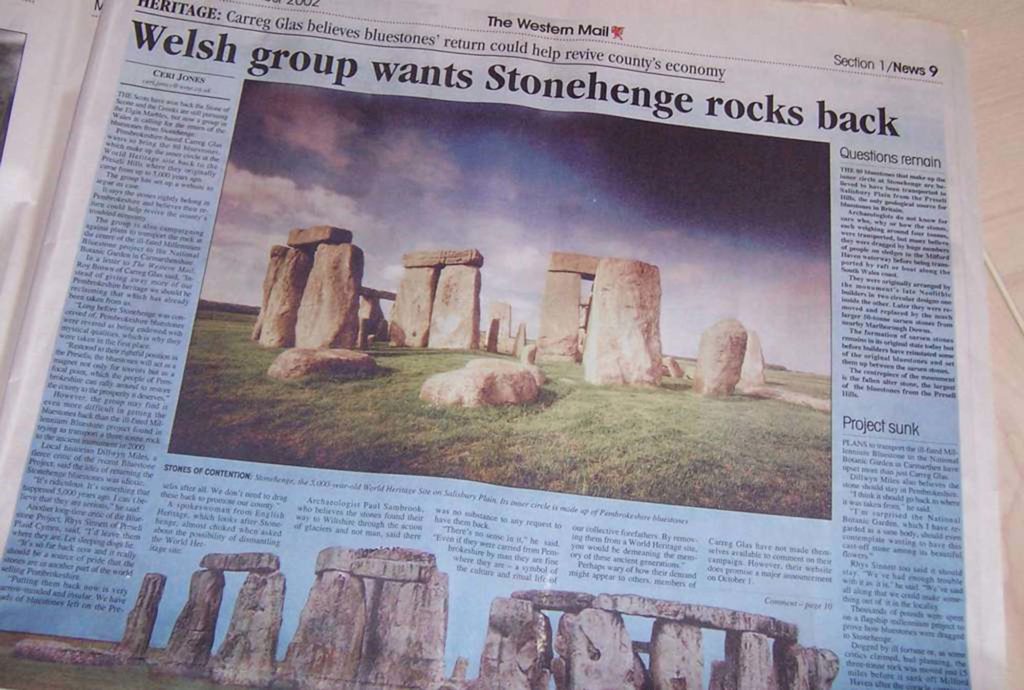
JAMES
So, Derek, we were talking about Dusty Springfield, and she’s been gone a long time, but in a sense, I suppose, we’re talking about legacy. She has this work and a legacy. Do you ever think about your own legacy and what you’d like for your own writing?
DEREK
What are you going to leave? I mean there are certainly things I want to write before I go. A couple of things I want to sort of explore. At the moment I’m writing a play about Richard Trevithick. He invented the steam engine – the railways. Not James Watt. Not the Stevensons. Trevithick had the very first working steam locomotive in Wales, in fact. And he was a fascinating character. Trevithick had loads of ideas, but he was absolutely useless at money, and he never got the fortune he thought he deserved. For some reason he never quite made it, and I’m trying to understand him.
That’s what it’s about – it’s exploring things – exploring people and motivations. And perhaps it’s trying to understand yourself, isn’t it? Maybe – you know – you’re writing things not just to explain things to other people but trying to explain things to yourself about yourself. I mean it’s the actor’s thing about when you’re playing a character – you don’t actually play the character you look for the character in yourself and express that because you actually bring the character out of you because it’s all in there somehow.
To find out more about playwright Derek Webb and his plays such as The Invisible Man, his series of comic Agatha Crusty Mysteries, or Roy Brown Comedies, among many others check out his website by following the link: Derek Webb Playwright.
This interview was conducted on August 21st 2021, and has been edited for length and clarity.
Because of COVID the Pint-sized Plays Festival ran a special show in 2021 featuring an evening of outstanding plays from past festivals.
A Night to Remember by Andrew Turner
Carol: Jackie Williams
Nigel: Gary Crane
Marc: Roger Leese
Directed by Cynthia Jennings
Winner in 2016
Two Woofs for Yes by Neil Walden
Brenda: Allison Butler
Ted: Steve Butler
Directed by Sarah Sherriff
Runner Up in 2016
Bottle for a Special Occasion by Bill Kovacsik
Martin: Bern Smith
Judith: Jean Smith
Runner Up in 2018
The Next Ivan Shiransky by Jim Geoghan
Ida: Carol Macintosh
Carl: Nick Wears
Directed by Carol Macintosh
Winner in 2020
Pub Play by Doc Watson
Man: Roger Leese
Woman: Jackie Williams
Extra: Steve Butler
Directed by Derek Webb
Runner Up in 2008
The Emperor’s New Clothes by Derek Webb
Dave: Nick Wears
Brian: Adam Edgerley
Pub Landlady: Sarah Sherriff
Directed by Sarah Sherriff
Runner Up in 2015
Never Give Up by James Hutchison
Todd: Gary Crane
Nigel: Ben Gabel
Directed by Cynthia Jennings
Winner in 2017
Vent by Gavin Harrison
Lisa: Andrea Thomas
Derek: Nick Wears
Kelvin: Steve Butler
Directed by Carol Macintosh
Winner in 2014
Attack of the Killer Banana Spider by John Moorhouse
Josh: Tom Wears
Sol: JakeWears
Directed by Bobbie Sheldrake
Winner in 2015
A Little Scotchie by John Spooner
Stephen: Bern Smith
Rachel: Anna Munro
Directed by Sarah Sherriff
Runner Up in 2020
Mrs. Thrale Lays on Tea! By Rob Taylor
Mrs. Thrale: Jackie Williams
Dr. Johnson: Nick Wears
Polly: Melissa Pettitt
Directed by Derek Webb
Winner in 2018
NOTE: ‘Winner’ or ‘Runner Up’ refers to the writing competition, not necessarily the Script Slam
